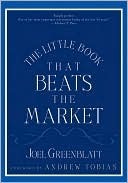More on this book
Community
Kindle Notes & Highlights
Read between
February 21 - February 26, 2018
In short, you are never required to act. You alone can choose to act only when the price offered by Mr. Market appears very low (when you might decide to buy some shares) or extremely high (when you might consider selling any shares you own to Mr. Market).
Graham referred to this practice of buying shares of a company only when they trade at a large discount to true value as investing with a margin of safety.
That 10 percent return, calculated by dividing the earnings per share for the year by the share price, is known as the earnings yield.
You would rather own a business that earns a high return on capital than one that earns a low return on capital!
if you just stick to buying good companies (ones that have a high return on capital) and to buying those companies only at bargain prices (at prices that give you a high earnings yield), you can end up systematically buying many of the good companies that crazy Mr. Market has decided to literally give away.
Graham’s formula involved purchasing companies whose stock prices were so low that the purchase price was actually lower than the proceeds that would be received from simply shutting down the business and selling off the company’s assets in a fire sale (he called these stocks by various names: bargain issues, net-current-asset stocks, or stocks selling below their net liquidation value).
The magic formula chooses companies through a ranking system. Those companies that have both a high return on capital and a high earnings yield are the ones that the formula ranks as best. Put more simply, the formula is systematically helping us find above-average companies that we can buy at below-average prices.
In other words, owning a business that has the opportunity to invest some or all of its profits at a very high rate of return can contribute to a very high rate of earnings growth!
In short, companies that achieve a high return on capital are likely to have a special advantage of some kind. That special advantage keeps competitors from destroying the ability to earn above-average profits.
Choosing individual stocks without any idea of what you’re looking for is like running through a dynamite factory with a burning match. You may live, but you’re still an idiot.


